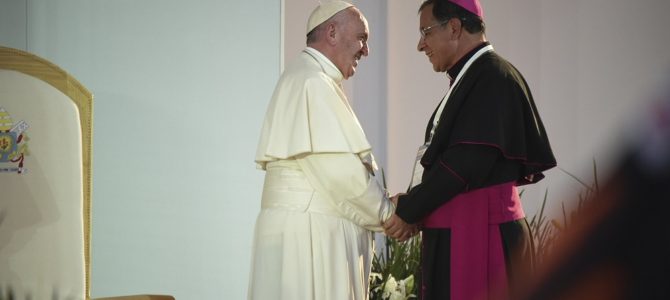
The Amazon Synod has convened. The game is on. It is a cheap confidence game, one that only a debased Vatican could summon. The comedy of hierarchs endorsing middlebrow eco-religion is outdone entirely by the tragedy of it.
Non-Catholics have good reason to pay attention to the month-long Synod of Bishops for the Amazon region just begun in Rome. An appointed advisory body, it was created to address a two-fold agenda: theologically significant issues (i.e., priestly celibacy) alongside facile environmentalist dogma. It is this second, more covert, ideological stance with far-ranging ramifications that concerns everyone.
Catholic media will have much to say over days and weeks to come about proceedings. Charges of heresy and apostasy will run parallel to high-sounding appeals to social justice and what the Instrumentum laboris calls “prophetic proclamation.” Proceedings will be combed, parsed, X-rayed from all angles. All except one: the fundamental dishonesty and intellectual poverty of the entire enterprise.
In a recent essay on The Catholic Thing, Robert Royal wondered why we need a synod on the Amazon at all. “What, exactly, is this, really, about?” It is a question worth asking at a time when— to seize a single example from a suffering world—Islamic jihad against Christians has reached genocidal proportions in Nigeria. Why not a synod on the agony of Nigerian Christians instead? Many know the answer but also know it is impolitic to state.
Among subterranean currents running through this synod, the deepest is an authoritarian lust to broker secular affairs—particularly ones in which authority to allot immense economic resources are at stake. One thing the synod is really about is power. Profane pursuit of it is submerged in pious boilerplate about “prophetic proclamation,” the sorrows of Mother Earth, and a show of selfless concern for the poor.
Bergoglio’s Vatican is maneuvering to re-establish institutional primacy in a once-Catholic nation that now inclines heavily toward evangelical and Pentecostal Protestantism. Contingent on that primacy is this pontificate’s ambition to install Rome as a principal player in the distribution of global assets. (Keep hold of Bergolio’s raw disdain for “the culture of late capitalism.” It was unmistakable when he invited Naomi Klein, a prominent actor in the environmental shakedown business, to the Vatican to participate in the unveiling of “Laudato Sí.”)
August brought us a key observation by José Luis Azcona, bishop emeritus of a Brazilian diocese in the Amazon River Delta: “The Amazon, at least the Brazilian Amazon, is no longer Catholic. . . . This point of departure is crucial for conducting the synod. If the Amazon has a Pentecostal majority, it is necessary to address that reality thoroughly. . . . Any nostalgia for an Amazon that no longer exists is fatal to its integral evangelization. Even in some areas of the Amazon the Pentecostal majority reaches 80%.”
Evangelization is askance of the point. By means of its trumpeted anxiety for “the future of the entire planet,” the synod works to strengthen Vatican standing as a claimant on the dispersal of undeserved wealth primarily from the abominable Western taxpayer. Apportionment is intended to pour off the societies that produced it and onto those whose cultures render them dependent on unbridled paternalism.
Anthropologist Roger Sandall described the “fortress theory” that keeps Amazonian Indians in the role of minors reliant on guardianship by the state and its adjutants: “Whatever is happening in the world around them, ethnic cultures should as far as possible be preserved unchanged. With the help of an army of administrative personnel, custodially responsible for seeing to it that they go on wanting the same things they have always wanted, their cultural heritage will be kept alive. Social change is bad—at least as it affects these picturesque tribal peoples—and should be stopped.”
As one example of that administrative army, Sandall cites the brigades supporting Indians on the Xingu reserve. The external affairs of that tribe alone are managed by “33 non-government organizations, bands of missionaries, anthropologists, well-wishers, journalists, doctors, and lawyers, both in Brazil and abroad.” Their internal interests are equally monitored and supervised by “a resident tribe of whites, composed of social scientists, doctors, teachers, nurses, biologists, and agronomists from all parts of Brazil.”
For the Instrumentum Laboris to romanticize—as it does—any of the Indians as “free peoples” is deceitful, if not cynical. They are more accurately called wards of the state, served by Catholic agencies jockeying for position among other nongovernmental organizations under the jungle palms.
The Vatican wants to leverage its position as a key stakeholder—a word by which Catholic Relief Services (CRS) identifies itself—alongside the United Nation’s International Labor Office, the Pastoral Land Commission (CPT), and such advocacy-and-policy groups as Repórter Brazil, a band of progressive journalists, social scientists, and educators. (The CPT is a controversial organ of the Brazilian Catholic Church. Since its founding in 1972, it has drawn severe criticism from conservative bishops for disproportionate involvement in politics and close ties to the Marxist-dominated Workers’ Party.)
The word stakeholder implies vested interest—a possibility of gain, a benefit measured out in subsidies, direct funding, real estate, or other non-spiritual assets. A stakeholder’s job is never finished.
Bureaucrats need shoes. The modern Vatican needs The Poor in much the same way that today’s Democrat Party needs a permanent underclass. This year’s designated Poor are in the Amazon. The Instrumentum promises to extend its sympathies to “the other important biomes of our world: the Congo basin, the Mesoamerican Biological Corridor, the tropical forests of the Asia Pacific region ad Guarani Aquifer, among others.”
Between the lines of that promise is admission that the Amazon is simply the first stop on a longer tour. The Bergoglian camarilla is mapping out an itinerary for a global road show of environmental sufferings. The “Church with an Amazonian face” will travel the planet’s biomes chanting doxologies to Mother Earth and the “ancient wisdom” of peoples who tread lightly on her—barefoot and without benefit of the internal combustion engine.
This Vatican is smitten with Nature, a phantasm of its own devising—an eternal Form plucked from the realm of Ideas. The synod’s preliminary manifesto repeats the word nature some 20-plus times. Only say the word and your grasping Western soul shall be healed.









